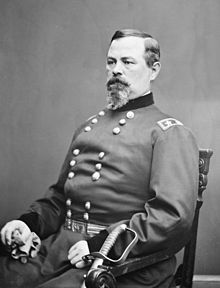Irwin McDowell
| Irvin McDowell | |
|---|---|

Photo of Irvin McDowell taken during the American Civil War
|
|
| Born |
October 15, 1818 Columbus, Ohio |
| Died | May 4, 1885 (aged 66) San Francisco, California |
| Place of burial | San Francisco National Cemetery, Presidio of San Francisco |
| Allegiance |
United States of America Union |
| Service/branch |
United States Army Union Army |
| Years of service | 1838–1882 |
| Rank |
|
| Commands held |
Army of Northeastern Virginia I Corps, Army of the Potomac III Corps, Army of Virginia Department of the Pacific Department of California Department of the West |
| Battles/wars | |
| Other work | Park Commissioner, San Francisco |
Mexican-American War
American Civil War
Irvin McDowell (October 15, 1818 – May 4, 1885) was a career American army officer. He is best known for his defeat in the First Battle of Bull Run, the first large-scale battle of the American Civil War. In 1862, he was given command of the I Corps of the Army of the Potomac. He fought unsuccessfully against Stonewall Jackson's troops during the Valley Campaign of 1862, and was blamed for contributing to the defeat of United States troops at the Second Battle of Bull Run in August.
McDowell was born in Columbus, Ohio, son of Abram Irvin McDowell and Eliza Seldon McDowell. He was a cousin-in-law of John Buford, and his brother, John Adair McDowell, served as the first colonel of the 6th Iowa Volunteer Infantry Regiment during the Civil War. Irvin initially attended the College de Troyes in France before graduating from the United States Military Academy in 1838, where one of his classmates was P. G. T. Beauregard, his future adversary at First Bull Run. He was commissioned a second lieutenant and posted to the 1st U.S. Artillery. McDowell served as a tactics instructor at West Point, before becoming aide-de-camp to General John E. Wool during the Mexican-American War. He was brevetted captain at Buena Vista and served in the Adjutant General's department after the war. While in that department he was promoted to major on May 31, 1856.
...
Wikipedia
